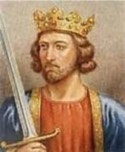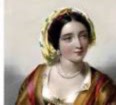Family Card - Person Sheet
Family Card - Person Sheet
NameKing Edward I. 
 1973
1973

 1973
1973Birth17 Jun 1239
Death7 Jul 1307
FatherKing Henry III (1207-1272)
MotherEleanor of Provence (ca1223-1291)
Misc. Notes
Edward I (17/18 June 1239 – 7 July 1307), also known as Edward Longshanks and the Hammer of the Scots (Latin: Malleus Scotorum), was King of England from 1272 to 1307. He spent much of his reign reforming royal administration and common law. Through an extensive legal inquiry, Edward investigated the tenure of various feudal liberties, while the law was reformed through a series of statutes regulating criminal and property law. Increasingly, however, Edward's attention was drawn towards military affairs. Edward I was a tall man for his era, hence the nickname "Longshanks". He was temperamental, and this, along with his height, made him an intimidating man, and he often instilled fear in his contemporaries. Nevertheless, he held the respect of his subjects for the way he embodied the medieval ideal of kingship, as a soldier, an administrator and a man of faith.
The first son of Henry III, Edward was involved early in the political intrigues of his father's reign, which included an outright rebellion by the English barons. In 1259, he briefly sided with a baronial reform movement, supporting the Provisions of Oxford. After reconciliation with his father, however, he remained loyal throughout the subsequent armed conflict, known as the Second Barons' War. After the Battle of Lewes, Edward was hostage to the rebellious barons, but escaped after a few months and joined the fight against Simon de Montfort. Montfort was defeated at the Battle of Evesham in 1265, and within two years the rebellion was extinguished. With England pacified, Edward joined the Eight & Ninth Crusade to the Holy Land. The crusade accomplished little, and Edward was on his way home in 1272 when he was informed that his father had died. Making a slow return, he reached England in 1274 and was crowned at Westminster on 19 August. 1974
The first son of Henry III, Edward was involved early in the political intrigues of his father's reign, which included an outright rebellion by the English barons. In 1259, he briefly sided with a baronial reform movement, supporting the Provisions of Oxford. After reconciliation with his father, however, he remained loyal throughout the subsequent armed conflict, known as the Second Barons' War. After the Battle of Lewes, Edward was hostage to the rebellious barons, but escaped after a few months and joined the fight against Simon de Montfort. Montfort was defeated at the Battle of Evesham in 1265, and within two years the rebellion was extinguished. With England pacified, Edward joined the Eight & Ninth Crusade to the Holy Land. The crusade accomplished little, and Edward was on his way home in 1272 when he was informed that his father had died. Making a slow return, he reached England in 1274 and was crowned at Westminster on 19 August. 1974
Spouses
Birth1241, Burgos, Spain
Death28 Nov 1290, Harby, England
FatherKing of Castile Firdinando III (-1290)
MotherJoan
Marriage1 Nov 1254, Las Huelgas, Burgos
Birth1279, Paris, France
Death14 Feb 1318, Marlborough Castle,
FatherPhilip III of France (1245-1285)
MotherMaria of Brabant (1254-1322)
Marriage1299
ChildrenEdmund (1301-1330)



